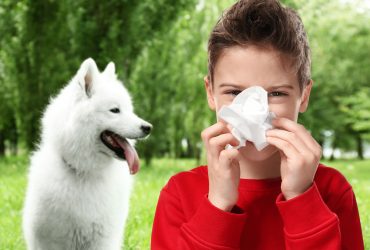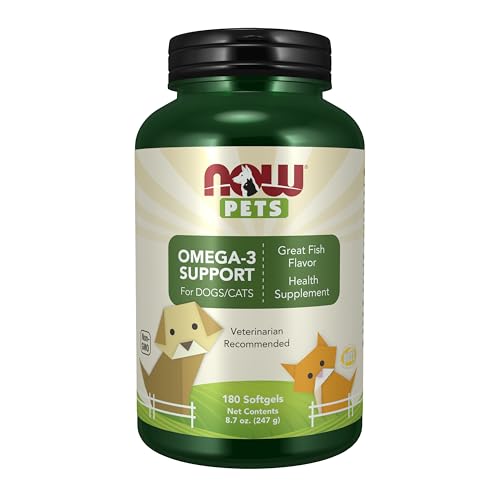In the United States, as many as 3 in 10 Americans suffer from pet allergies. This is a sad statistic as most people want to have a furry friend in their life. Luckily, there are some dog breeds that are hypoallergenic. One of these breeds might just be the cute, fluffy, and happy Samoyed. Is it possible to suffer from Samoyed allergies? Or is the breed hypoallergenic? Let’s find out!
Table of Contents
Do Samoyed Allergies Exist?
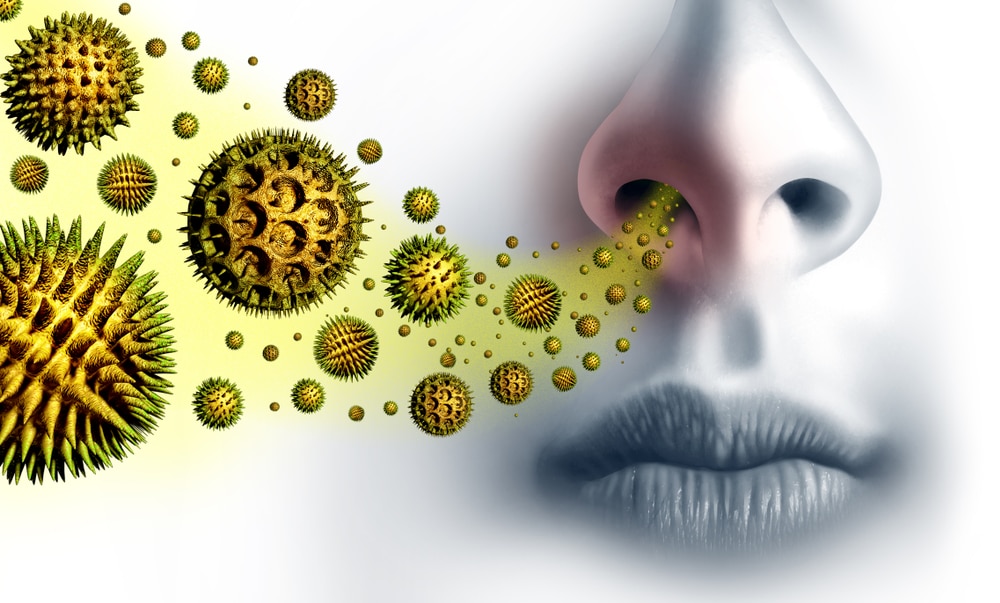
Other than their charming smiles, another main feature of the Samoyed is their thick fur coat. This coat sheds at least twice a year and needs to be groomed daily to reduce shedding. A slicker brush is the ideal tool for keeping your Samoyed’s coat healthy and tangle-free. You may find that when you are grooming your Samoyed you experience an allergic reaction. That’s because you are closer to the allergy-causing dander, which we will discuss later in the article. When you brush the Samoyed you loosen dander and allow it to get onto your clothes and into the air. After grooming your Samoyed it’s a good idea to wash your clothes and take a shower to prevent further reactions.
Usually the term hypoallergenic is used when referring to hand soaps, detergents, or fabrics. It signifies that these products are not likely to produce an allergic reaction. However, no product is 100% hypoallergenic, and unfortunately, no dog breed is either. Even if a dog is considered hypoallergenic, you or someone in your home, might still experience an allergic reaction. With that being said, Samoyed allergies are rare. Even if you get teary-eyed and itchy around other dog breeds, you’re not likely to have a reaction to a Samoyed’s luxurious white fur. However, some say that the Samoyed should not be included in a list of hypoallergenic dogs.
What Causes Samoyed Allergies?
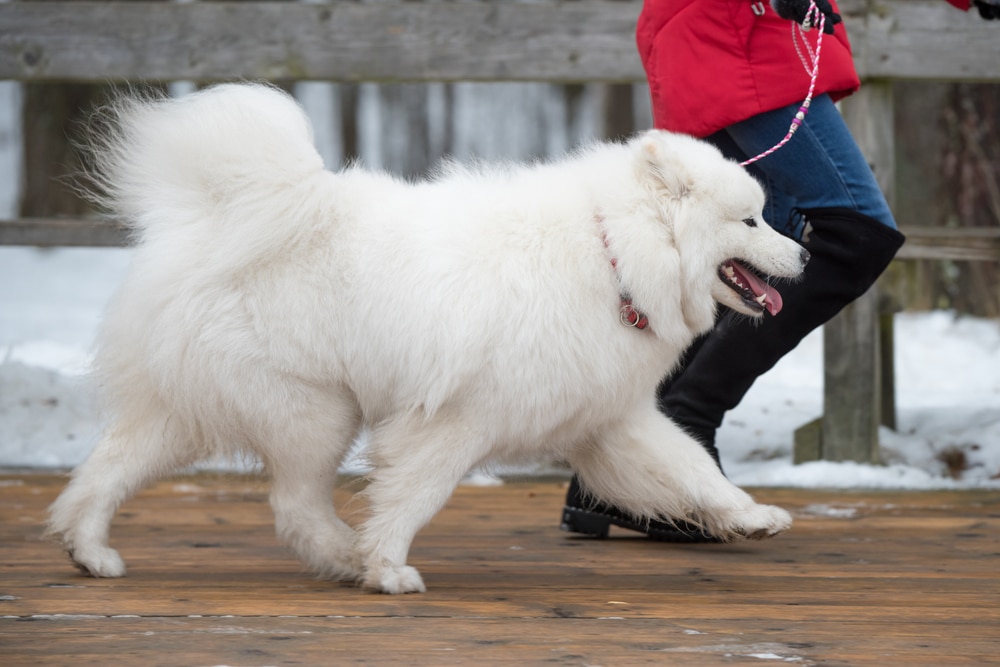
What Is Dander?
When people are allergic to dogs, and pets in general, they are reacting to the dander or oil the dog produces. Dander can be found in dead skin cells trapped in a dog’s fur. These cells can spread all around an area including carpets, couches, and beds. Dander can also float through the air. Dogs who produce a lot of oil and dander are more likely to trigger allergic reactions. For example, Golden Retrievers, German Shepherds, and Dachshunds are breeds that most allergy sufferers are allergic to. Dander can also be found in a dog’s urine and saliva. So if you do suffer from pet allergies, they do not result from the fur itself, rather the dander trapped in the fur.
Samoyed allergies, while uncommon, still exist. Samoyeds produce less dander than other breeds, so having an allergic reaction to them is less likely. However, Samoyeds still produce some dander, so sensitive individuals will have a reaction. It’s always a good idea to have some allergy medication on hand when visiting a dog owner, even if they own a Samoyed.
- 100 DAYS OF 24 HOUR NON-DROWSY ALLERGY RELIEF: Claritin contains 10 milligrams of loratadine per tablet, that blocks the effects of histamines in the body
- POWERFUL, 24 HOUR INDOOR AND OUTDOOR ALLERGY PILLS: Relief of your worst allergy symptoms including sneezing, runny nose, itchy watery eyes, and itchy throat or nose
- NO PRESCRIPTION NEEDED: Find relief of allergy symptoms triggered by over 200 indoor and outdoor allergens from pets, pollen, dust and mold*
- TRUSTED BRAND: #1 doctor recommended non-drowsy oral OTC allergy brand
- INDICATED FOR AGES 6 YEARS AND OLDER: Prescription strength, allergy relief that lasts all-day
What’s In Dander That Triggers Allergies?

Dander contains the protein KNF-1, which triggers allergies. Samoyeds have fewer of these protein chains in their mucous, urine, and saliva, making them a nearly hypoallergenic breed. It all depends on your sensitivity to the protein. With some allergy sufferers, the more they expose themselves to KNF-1, the less of an effect it has. However, this is not always the case.
Dander Is Not The Only Cause of Samoyed Allergies
Even if your Samoyed produces less dander than other dogs, its fur and shedding in the summer can also cause allergies. Most people suffer from spring and summertime allergies to pollen. People also experience dust allergies throughout the year. The double-layered thick coat of the Samoyed is perfect for trapping pollen and dust particles. So if the fur scatters around your home in the summertime, when your Samoyed is shedding, you or people visiting your home might experience allergies. However, these allergies are unrelated to Samoyeds or dogs in general. Cleaning your house during shedding months is essential. Make sure you have a good vacuum with a “pet-hair” setting.
- THOROUGH CLEANING POWER: The Hoover MAXLife Pro Pet Swivel Vacuum delivers a powerful clean. Its advanced filtration technology with a sealed allergen system ensures even the most stubborn debris is effortlessly trapped.
- OPTIMIZED CLEAN: The Advanced Action brush roll is designed to go deep into carpet and effectively sweep hard floors, picking up more dirt with every pass. The brush roll works to reduce hair wrap, ensuring a more efficient clean.
- VERSATILE TOOLS: Clean beyond your floors and target hard-to-reach areas with 13 feet of extended reach combined with the included pet upholstery tool, crevice tool and dusting brush. Swivel steering provides effortless maneuverability.
- EFFECTIVE FILTRATION: With WindTunnel technology for stronger suction, MAXLife filtration for extended vacuum life and a sealed allergen HEPA filter to trap particles, this vacuum gets the job done right.
- NOBODY DOES IT LIKE YOU: For more than 100 years, Hoover has designed powerful, reliable, easy-to-use products that clean your entire home from floor to ceiling. It’s why we’re one of the most trusted brands in America.
The Samoyed Advantage
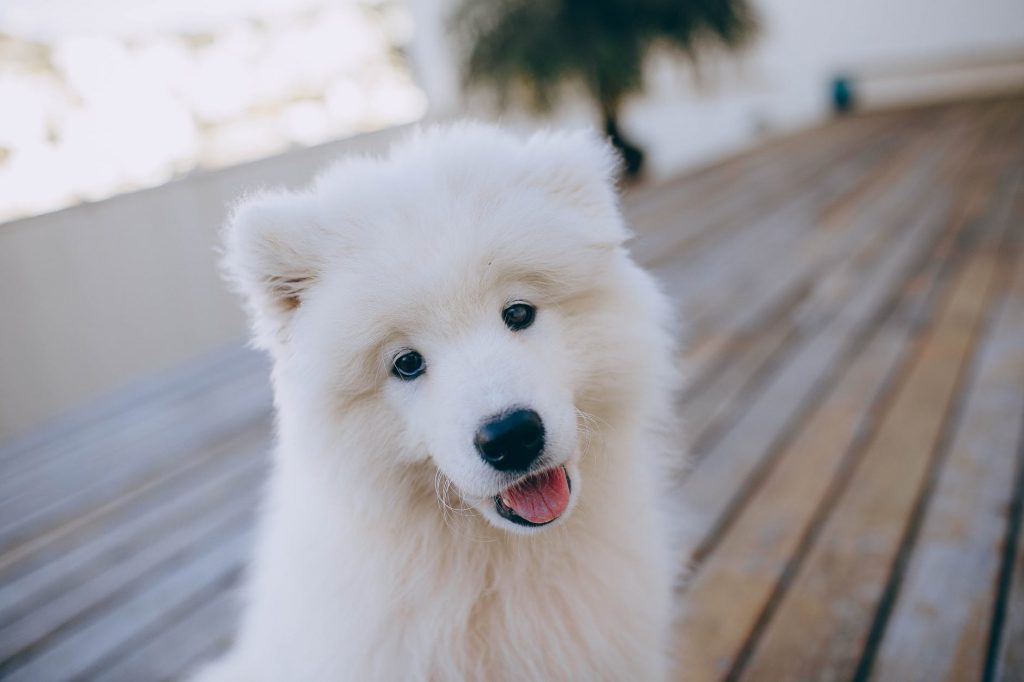
One of the most notable features of a Samoyed is their smile. The breed always looks friendly and approachable. But the upturned corners of their mouth actually serve a purpose. Thanks to their smiles, Samoyeds do not drool, which means the KNF-1 allergy-causing protein does not spread around your home. This makes Samoyed allergies almost non-existent.
In addition to their smiles, a Samoyed’s double-thick coat keeps dander closer to their body, preventing it from escaping into the environment.
Keeping Your Home Clean
Since dander can travel through the air, it’s important to install a high-quality air purifier in your home. Not only will it remove any dander-related allergies, but it also eliminates pollen and dust from your home. Installing an air purifier, vacuuming often, and washing blankets and pillows will minimize any allergens around your home.
Getting Your Samoyed On A Clean Diet To Reduce Allergies
The type of food we eat affects our skin. For example, eating too many fried foods can result in acne and a greasy complexion. Dogs are the same. Dander is found in dead skin cells, and the healthier your Samoyed’s diet is, the less dead skin it will have. You’ll want to put your Samoyed on a diet rich in omega-3s and fatty acids. Without these nutrients, they are more likely to shed skin. Not only will these nutrients improve the health of your Samoyed’s skin, but they will also create a shinier and fuller coat. If you can’t find dog food high in omega-3s make sure you give your dog supplements as an alternative.
- MULT-PURPOSE SUPPORT: Omega-3 fatty acids support joint health, normal brain function, and immune response to seasonal changes
- SUSTAINABLY SOURCED: Our omega-3 softgels contain clean sources of anchovy and sardine
- NASC CERTIFIED: Certified by the National Animal Supplement Council (NASC), an organization that protects and enhances the integrity of the animal health product industry
- PET-PARENT APPROVED: Manufactured with the same attention to quality and detail NOW puts into their supplements intended for humans, from the sourcing of top-quality ingredients to finished product testing
- Packaged in the USA by a family owned and operated company since 1968
In addition to a proper diet, bathing your Samoyed is a must to prevent allergies, especially during shedding season. You can bathe your Samoyed inside or outside the home. It’s not recommended to bathe a Samoyed on grass as they will quickly become dirty again in the mud. Washing Samoyeds on patio stones may damage their nails, which will soften as you wash them. The best place to wash your Samoyed is in a kiddie pool. And be sure to use dog-friendly shampoo containing nutrients to revitalize your dog’s fur.
Be Cautious
Many breeders and pet stores will try to sell you on the belief that Samoyeds are hypoallergenic. Again, no animal or product is 100% hypoallergenic. And because of this said “feature,” these breeders will usually charge extra for Samoyed puppies.
In Conclusion
Samoyed allergies do exist as the dog is not 100% hypoallergenic. Unfortunately, no animal is. All of them produce dander and KNF-1. Your reaction will depend on your tolerance to both. If you have a high level of tolerance toward dander and KNF-1 then a Samoyed is a suitable pet for you. The only way you’ll know for sure is to be around Samoyeds. Most breeders have no problem letting you play with their puppies or dogs while educating you on the breed.
If you buy a Samoyed and notice you are experiencing some allergies, make sure to clean your house regularly, feed your Samoyed a healthy diet, and groom their coats often. This will lower the frequency of your reactions and allow both you and your Samoyed to live happily.
Do you own a Samoyed? Do you or anyone else in your home experience allergies? If so, how do you manage them? We’d love to hear from you in the comments below!
